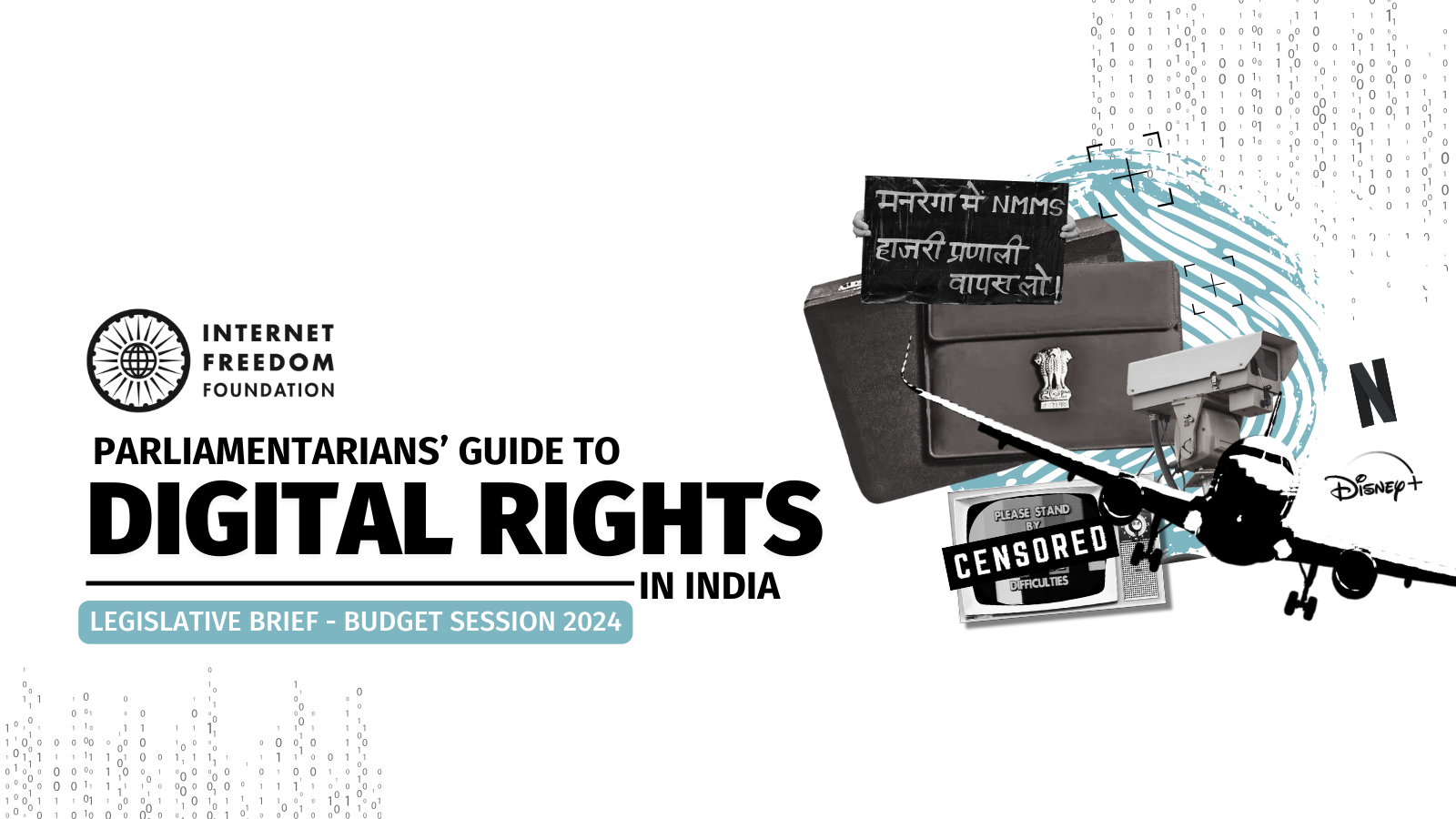
tl;dr
We are pleased to share our legislative brief on digital rights for the Budget Session 2024 of the Indian Parliament – a round-up of digital rights issues for parliamentarians to consider as the session convenes on January 31, 2024. In the brief, we highlight key areas of concern in the domains of digital and freedoms rights, data privacy, data protection, censorship, and adjacent concerns, that require extensive deliberation in both houses of the Parliament.
Introduction
The Budget Session of the Indian Parliament will commence on January 31, 2024 and is expected to conclude on February 09, 2024, as per an official Office Memorandum released by the Government of India. The Interim Budget for this financial year will be released on February 01, 2024 and no question hour will be conducted on that day.
The previous session of Parliament concluded on December 21, 2023, when both Houses of Parliament adjourned sine die a day ahead of schedule. The Session saw the introduction of 12 bills and the passage of 19 Bills by both the Houses of Parliament. These include several key legislations, namely, the Telecommunications Bill, 2023 (Telecom Bill, 2023) and the three criminal reform bills. Read our Digital Rights Review of the winter session here. The second half of the Parliament Winter Session was particularly notable as the Lok Sabha saw a security breach, post which 100 MPs were suspended from the Lok Sabha and 46 from the Rajya Sabha, accounting for 19% of the strength of each House. This is the highest number of suspensions in the history of Parliament so far. Strikingly, the suspended MPs all belonged to the opposition parties, which consequently led to the passage of above mentioned crucial bills in both Houses with minimal debate and little to no inputs from the opposition. Even though Lok Sabha functioned for 74% of its scheduled time, and Rajya Sabha for 81%, the expedited passage of significant legislations and the increased productivity was influenced by the suspension of several Members of Parliament, leading to swift approvals with limited deliberations and minimal input from the opposition.
Summary of the Overall Analysis of the 2023-2024 Union Budget
The Union Budget for Financial Year 2023-24, released on February 01, 2023, cumulatively allotted ₹1.25 lakh crores to the National Health Mission (NHM), the Ministry of Electronics and Information Technology (MeitY), the Ministry of Information and Broadcasting (MIB), the Department of Telecommunications (DoT), and Ministry of Home Affairs (MHA). Increased allocations in the 2023-24 Budget as compared to the 2022-2023 Budget is a positive sign. The budgetary allocation by MeitY has witnessed the highest increase of 41.2%, however, this increase is accompanied with complete discontinuation of fund allocation towards PMGDISHA, which is a rural digital literacy scheme. Furthermore, the trend of decreasing fund allocation in revised estimates and under-utilisation of funds in 2022-2023 is a cause of worry. It remains to be seen if the same trend will be witnessed in the FY 2023-2024. It is also worrying to note a decreasing trend in the MHA budget allocation for Cyber Crime Prevention against Women and Children and Miscellaneous Schemes. Read more on our Analysis of the Union Budget 2023-2024 here.
Potential issues to be deliberated upon in the upcoming session
- Challenges and Concerns: Delays, Mystery, and Shortcomings in the Digital Personal Data Protection Rules and Act: The Digital Personal Data Protection (“DPDP”) Act was passed without adequate public consultation or due consideration to parliamentary rules and procedure. The Act has several deficiencies, such as vague or indefinite provisions, excessive delegated legislation in the absence of relevant safeguards, weak notice requirements for data sharing, storage or transfer, and allows for processing of data without consent “certain legitimate uses” which are left inadequately defined. Reportedly around 21 draft rules under the DPDPA, 2023 will be released for a 45-day public consultation. Where MeitY invited feedback and public comments on the 24-page draft DPDP Bill, 2022 for 30 days, a 45-day consultation period for 21 draft rules that will give the parent legislation substantive and procedural teeth is highly inadequate and requires reconsideration.
- Presidential Approval Grants Official Status to Criminal Reform Laws as Acts of Parliament: Three bills overhauling current Indian criminal laws were passed by both houses of the Parliament in the 2023 Winter Session, and received Presidential assent on December 25, 2023. The bills contain several provisions that threaten the fundamental rights to privacy and free speech. Provisions of the bill attempt to digitise many aspects of criminal procedure, and include ‘digital evidence’ under the ambit of the evidence law, without outlining procedural safeguards. Though the word ‘sedition’ has been deleted from the law, the concept is retained through vague provisions, which leaves room for arbitrary application. Executive powers pertaining to search and seizure of digital evidence have also been broadened. The review and recommendations of the Parliamentary Committee on Home Affairs on the bills did not adequately address these shortcomings.
- Preserving Colonial Perspectives: Analysis of the Telecommunication Act’s Retention of Antiquated Approaches: The draft Indian Telecommunication Bill ("Telecom Bill”), 2023 was passed in the 2023 Winter Session within three days of introduction after minimal discussion. The Telecommunications Act, 2023 echoes the language and choices employed in the colonial Telegraph Act, 1885 and empowers the government to pause transmission and intercept messages "during public emergencies to prevent incitement for committing offenses" on the broad grounds of public safety. There is also uncertainty regarding the applicability of the Act to “Over-the-Top” (“OTT”) communication services like WhatsApp. The Act allows for excessive surveillance and suspension of internet services without adequate accountability, oversight, or necessary procedural safeguards. It misses a huge opportunity to reform the telecommunication sector and create a rights-centric law that protects user rights instead of infringing on it.
- The draft Broadcasting Services (Regulation) Bill, 2023 raises concerns for online free speech: The MIB released the Broadcasting Services (Regulation) Bill, 2023 (“Broadcasting Bill”) for public consultation on November 10 and accepted comments till January 15, 2024. The draft bill includes “Over-the-Top” (“OTT”) content & digital news published by individuals under the regulatory ambit raising concerns for online free speech and journalistic freedom. Exerting executive control over “OTT” content will lead to over-compliance and self-censorship on part of platforms, who will be keen to avoid the wide discretion allowed to the government when it comes to punishments. Risks around censorship of speech expressing satire, irony, sarcasm, dissent, anger, even maybe portrayals of facts and hard-hitting truth which is unpalatable to the Union government or politically influential and powerful communities, may become formalised if the Broadcasting Bill becomes a law of parliament.
- Rushed intervention for tackling the issue of Deepfakes must be revisited: In December 2023, MeitY issued an advisory to all intermediaries urging them to follow the due diligence obligations listed under the notified Information Technology (Intermediary Guidelines and Digital Media Ethics Code) Amendment Rules, 2023 (IT Rules, 2023). This formal advisory as well as several other notices sent to intermediaries reiterated the need to take proactive steps to curb ‘online harms’ on the internet, particularly the rising instances of deepfakes. In early January 2024, reports surfaced that MeitY is considering amending the IT Rules, 2021 to explicitly define deepfakes and mandate intermediaries to make "reasonable efforts" to avoid hosting them. The media coverage of informal statements by Ministers and unnamed officials around the approach to tackle deepfakes has generated confusion and raised concerns about hasty and superficial interventions. Pursuing rushed policy or regulatory actions based on a few closed-door meetings with technology platforms without engaging in a broader multi-stakeholder consultation may become counter-productive.
- Social impact of emerging technologies: State and union governments are deploying artificial intelligence (“AI”) on a large scale across sectors, spanning uses in urban administration, policing, surveillance, and welfare service delivery, to name a few. The deployment manifestly lacks transparency. State and union governments often do not make public the accuracy assessments or reports of the technologies they use across sectors. They do not reveal adequate information about the usage in the press releases or tenders. Research recommends that artificial intelligence, in its present form, should not be used in welfare service delivery like they currently are – as the datasets are often not free from bias. The manner of rapid and opaque deployment of AI in public sectors suggests that state and union governments may be using emerging technologies as “snake oil”, where an increasing number of interventions are being labelled “AI-powered” without evidence. Additionally, some government initiatives such as using AI to detect distress on people’s faces or fatigue in drivers’ eyes, are not based in science, as AI globally does not yet possess the ability to do so. At this stage, the use of emerging technologies in the public sector must stop or, at the least, be severely restricted, especially in the absence of research and understanding on AI technology.
There’s this and much more in our Legislative Brief
This is a sneak peek at some of the issues we have covered in-depth in our brief, including data on telecom and internet connectivity; statistics on implementation of schemes; details on key areas of digital governance such as public consultations, privacy and data protection, free speech, access to internet, and surveillance. For more analysis, statistics, and insight into future legislative developments related to digital rights, see here!


